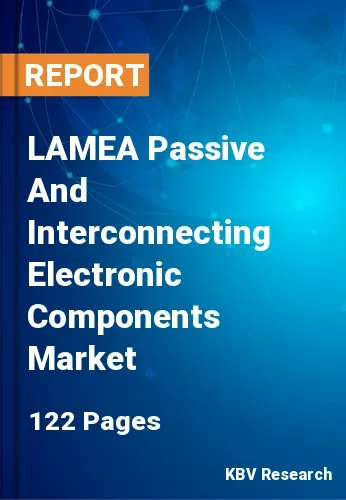The Latin America, Middle East and Africa Passive And Interconnecting Electronic Components Market would witness market growth of 8.3% CAGR during the forecast period (2022-2028).
An electronic interconnect device connects two conductors, allowing current or light waves to pass from one to the other. An integrated circuit (IC) on a silicon or metal die is housed in an electronic packaging that is made of plastic, ceramic, or metal.
The international market for passive and linking electronic components is expanding rapidly, and this trend is projected to continue in the next years. Electronic components that are passive and interconnected are utilized in electronic devices such as cellphones, laptops, electrical home appliances, and game consoles. Computers, consumer electronics, telecommunications, and a variety of other industries rely on these components. Sockets, connectors, printed circuit boards, relays, switches, and other interconnecting devices are only a few examples.
In May 2013, the UAE embarked on a two-year effort to transition from eGovernment to mGovernment. Following a gathering of government leaders, a new government vision was announced. The goal was to make all priority services accessible online through two channels: Mobile phone applications and websites.
The UAE has a great rate of mobile governance in 2015. With the help of 41 government agencies, 96.3 percent of the UAE government's most used 337 services were converted to mGovernment and mServices in just 730 days. The most significant change that occurred during those two years was a shift in the philosophy and culture of government service management. Today, service delivery is based on advanced technology and innovative minds rather than physical offices and thousands of personnel, which has resulted in a tremendous increase in the rate of smart transformation, with 98.18 percent of federal government services available online.
In the UAE, illiteracy is less than 1%, hence it is not a barrier to internet use. Emirati schools are progressively becoming internet-connected and equipped with eLearning resources, and many of them encourage students to use tablet computers. The Mohammed Bin Rashid Smart Learning Program was developed with the goal of creating a unique learning environment in schools by introducing 'smart' classes.
The Brazil market dominated the LAMEA Passive And Interconnecting Electronic Components Market by Country in 2021, and would continue to be a dominant market till 2028; thereby, achieving a market value of $5,179.9 million by 2028. The Argentina market is estimated to grow at a CAGR of 8.9% during (2022 - 2028). Additionally, The UAE market would witness a CAGR of 8% during (2022 - 2028).
Based on Type, the market is segmented into Interconnecting, and Passive. Based on Interconnecting Type, the market is segmented into Connectors/Sockets, PCB, Switches, Relays, and Others. Based on Passive Type, the market is segmented into Capacitors, Resistors & Inductors, Transformers and Diode. Based on Application, the market is segmented into Consumer Electronics, Aerospace & Defense, IT & Telecom, Automotive, Industrial, Healthcare and Others. Based on countries, the market is segmented into Brazil, Argentina, UAE, Saudi Arabia, South Africa, Nigeria, and Rest of LAMEA.
Free Valuable Insights: The Global Passive And Interconnecting Electronic Components Market is Predict to reach $248.5 Billion by 2028, at a CAGR of 5.3%
The market research report covers the analysis of key stake holders of the market. Key companies profiled in the report include TE Connectivity Ltd., Samsung Electro-Mechanics Co., Ltd. (Samsung Group), Fujitsu Limited, Vishay Intertechnology, Inc., Panasonic Corporation, Rohm Semiconductors Co., Ltd., TDK Corporation, Murata Manufacturing Co., Ltd., Yageo Corporation, and Koch Industries, Inc. (Molex LLC).
By Type
By Application
By Country

Our team of dedicated experts can provide you with attractive expansion opportunities for your business.

